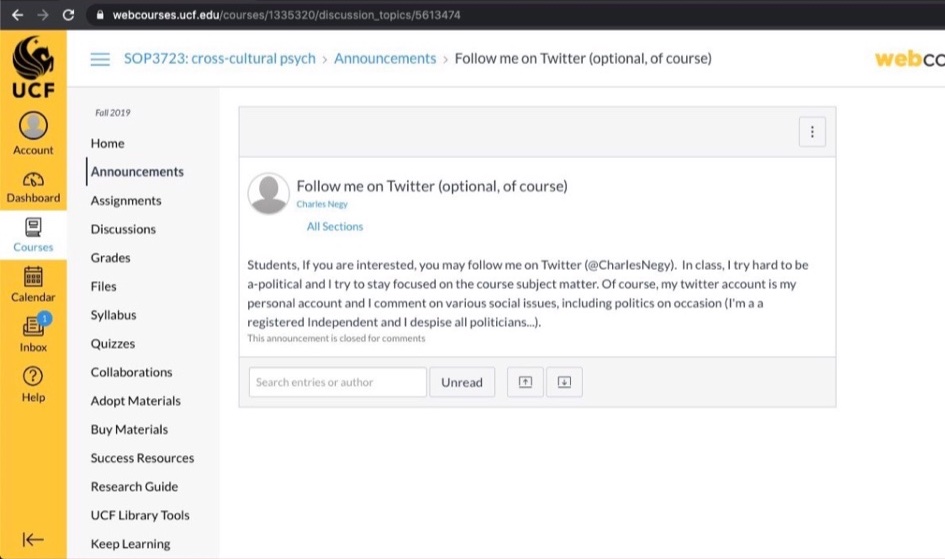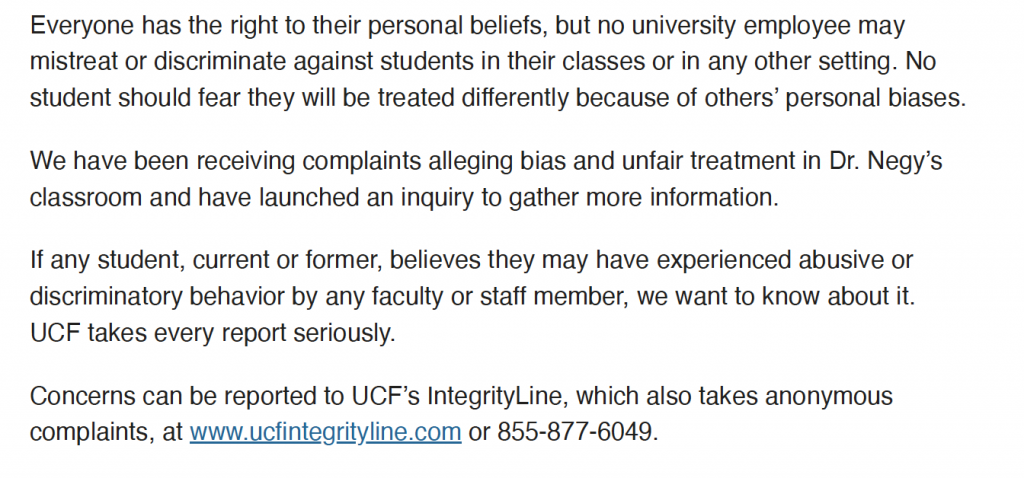During a virtual forum on Thursday, students asked UCF’s president how he planned to fire Charles Negy over the Twitter posts students considered “dishonorable comments toward the black community.”
UCF President Alexander Cartwright said there are systems in place the university will use to investigate Negy, an associate professor in UCF’s Department of Psychology.
“When you look at a faculty member’s behavior, you need to consider whether that behavior is personal and whether it translates into their behavior in the classroom,” he said. “We will look at any such behavior and we will, after careful deliberation, come to a decision.”
Students have reached out to Knight News with screenshots of an announcement Negy has sent to some students.
The announcement includes a message to follow him on Twitter — if they want to — where he tries to be “a-political” and “stay focused on the course subject matter.”

Does the First Amendment stop UCF from firing Charles Negy? Cartwright said it depends if his online behavior translated into the classroom.
FIRE — the Foundation for Individual Rights in Education — a nonprofit group that focuses on protecting free speech rights on college campuses around the country, weighed in on the matter.
Adam Steinbaugh, First Amendment lawyer at FIRE, said the First Amendment broadly protects the rights of faculty and students at public universities, which are government institutions.
“Those rights protect faculty members who speak on matters of public concern as private citizens, such as on their own social media accounts,” he said. “This holds true even when others, or even most people, find the speech to be deeply offensive.”
Steinbaugh said the importance of protecting freedom of expression is that you are protecting viewpoints that are unpopular and not always welcome in broader society.
He said if you can restrict speech based on the notion that it is deeply offensive to others, then individuals in power can look for their own ways to suppress speech.
“It’s disappointing to see institutions that falter in their defense of free speech because that puts at risk everyone’s speech,” Steinbaugh said.
Steinbaugh said it is important that public universities do not abandon that commitment — which has been clear, consistent law across decades of decisions from the Supreme Court on down — in times of great political and social turbulence.
“We’ve seen time and time again that restrictions on the speech we abhor will ultimately lead to suppression of the speech we find moving,” Steinbaugh said.
During Thursday’s virtual forum, Cartwright said he strongly condemns Negy’s racist posts and said they do not reflect the values of UCF as an institution.
“I promise you, this is a matter that has our full attention,” Cartwright said. “We have launched an inquiry to quickly — but fully — evaluate the situation.”
Cartwright said as a community, UCF must acknowledge and support the right to free speech but it can not translate into discrimination in the classroom.
UCF’s Collective Bargaining Agreement — its faculty union contract — states employees are free to express their opinions to the larger community on any matter without discipline or restraint due to the content of those messages.
UCF interim Provost Michael Johnson shared his thoughts on Negy’s tweets during the student virtual forum on Thursday.
“In addition to constitutional rights, the principle of academic freedom protects the right of faculty members to hold and teach unpopular views,” Johnson said. “But that doesn’t make what Negy said any less vile.”
Negy denied a phone interview, but said in a tweet to Knight News his tweets did not represent UCF.
What is the UCF community saying?
“We have been receiving complaints alleging bias and unfair treatment in Dr. Negy’s classroom and have launched an inquiry to gather more information,” a Thursday UCF statement reads.
UCF said in the statement that everyone has the right to their personal beliefs, but no university employee may mistreat or discriminate against students.
“If any student, current or former, believes they may have experienced abusive or discriminatory behavior by any faculty or staff member, we want to know about it. UCF takes every report seriously,” the university said in a statement.

Individuals are encouraged to speak up using anonymous and secure resources like UCF’s Office of Institutional Equity or the UCF Integrity Line — which take complaints online or by phone at 855-877-6049.
Tosha Dupras, interim dean of the College of Sciences, said in a Thursday statement to students in the college that Negy’s comments are not representative of the values of the college or its commitment to equity, diversity, and inclusion.
“I have received many emails expressing concern and outrage regarding the Twitter content belonging to Dr. Charles Negy,” Dupras said in the statement sent to College of Sciences students. “I would like to thank those of you who stepped forward to say something and alert me about this issue.”
Rep. Carlos Smith — who represents a large portion of east Orlando and UCF in District 49 — posted on Twitter than the tenured psychology’s tweets were those of a white supremacist, not of a professor in higher education.
Rob Dvorak, an associate professor in UCF’s psychology department, took to social media to express his thoughts on Negy’s Twitter posts.
The university has not directly responded to Knight News for comment.
UCF will host a virtual conversation about race and unity with the campus community from 2 p.m. to 3:30 p.m. Friday. Questions and experiences can be asked and shared using UCF’s form ahead of the event.
This is a developing story. Check back for updates.




